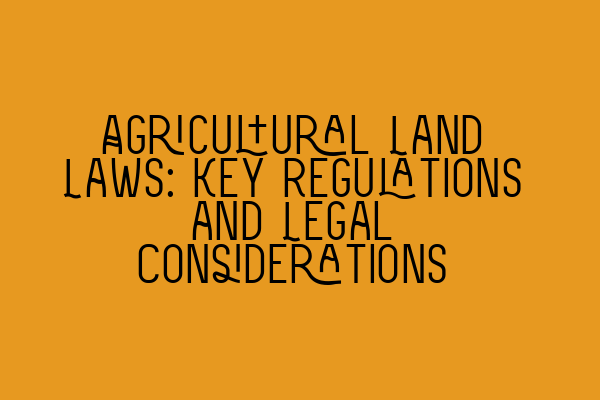**Agricultural Land Laws: Key Regulations and Legal Considerations**
When it comes to agricultural land, there are numerous regulations and legal considerations that both landowners and farmers need to be aware of. Understanding these laws is crucial for navigating the complexities of buying, selling, and using agricultural land. In this article, we will explore some key regulations and legal considerations related to agricultural land, providing you with the knowledge you need to ensure compliance and protect your interests.
**1. Planning Permission and Land Use**
Before you begin any agricultural activity on a particular piece of land, it is important to determine if you have the necessary planning permission. This permission is usually required for any significant changes to the land, such as building structures, erecting fences, or changing the land’s use. It is essential to consult with your local planning authority to understand the specific regulations and obtain the necessary permissions.
In addition to planning permission, it is crucial to consider the land use restrictions in place. Certain areas may have designations that restrict or prohibit certain activities, such as farming practices that could harm protected habitats or conservation areas. Familiarizing yourself with these restrictions beforehand will help you avoid potential legal issues down the line.
**2. Environmental Regulations**
Agricultural activities can have significant environmental impacts, and therefore, there are regulations in place to protect the environment and wildlife. Compliance with these regulations is crucial for avoiding penalties and ensuring sustainable land management.
One key regulation to be aware of is the Cross Compliance System, which sets out a range of environmental, animal welfare, and public health standards that farmers must meet in order to receive certain subsidies. These standards cover aspects such as soil management, water and air pollution control, and biodiversity conservation.
Additionally, the Environmental Stewardship Scheme provides financial incentives for farmers to adopt sustainable land management practices, such as habitat preservation and agri-environmental measures. Participating in these schemes not only promotes environmental conservation but can also bring financial benefits to landowners.
**3. Agricultural Tenancies**
Agricultural tenancies are legal agreements that govern the use of agricultural land. Whether you are a landowner renting out your land or a farmer leasing land for agricultural purposes, understanding the key provisions of these tenancies is essential to protect your rights and interests.
Common forms of agricultural tenancies in the UK include Farm Business Tenancies (FBTs) and Agricultural Holdings Act (AHA) tenancies. Each type of tenancy comes with its own rights and responsibilities for both the landlord and tenant, such as rent review provisions, termination rights, and succession rights.
It is important to ensure that any agricultural tenancy agreement is properly drafted to reflect the intentions and obligations of both parties. Seeking professional legal advice in the preparation and negotiation of these agreements can help prevent disputes and minimize potential legal risks.
**4. Agricultural Subsidies and Grants**
The UK government provides various subsidies and grants to support agricultural activities and promote rural development. These schemes can provide significant financial assistance to farmers and landowners, helping to enhance productivity, environmental sustainability, and rural communities.
For example, the Basic Payment Scheme (BPS) provides direct payments to farmers based on the land they farm and the environmental practices they adopt. Other schemes, such as the Countryside Stewardship Scheme and the Rural Development Programme, offer financial support for activities such as tree planting, flood management, and renewable energy projects.
To take advantage of these subsidies and grants, it is important to understand the eligibility criteria, application deadlines, and compliance requirements. Keeping up to date with these schemes can help you maximize your funding opportunities and support the long-term sustainability of your agricultural activities.
**Conclusion**
Navigating the legal landscape surrounding agricultural land can be complex and daunting. However, by understanding the key regulations and legal considerations outlined in this article, you can ensure compliance, protect your interests, and make informed decisions regarding the use of agricultural land. Regardless of whether you are a landowner or a farmer, staying up to date with the latest developments in agricultural law is crucial for success in the agricultural sector.
For more information on related legal topics, please explore the following articles:
– [Misrepresentation in Contracts: Unveiling Deceptive Practices](https://contract-law-sqe.co.uk/misrepresentation-in-contracts-unveiling-deceptive-practices/)
– [A Closer Look at SQE Contract Law Syllabus](https://contract-law-sqe.co.uk/a-closer-look-at-sqe-contract-law-syllabus/)
– [SQE Contract Law: Analyzing Landmark Cases and Influential Judicial Decisions](https://contract-law-sqe.co.uk/sqe-contract-law-analyzing-landmark-cases-and-influential-judicial-decisions/)
– [Contract Law for Services: Key Considerations and Best Practices](https://contract-law-sqe.co.uk/contract-law-for-services-key-considerations-and-best-practices/)
– [Understanding Contractual Capacity: Rights and Limitations](https://contract-law-sqe.co.uk/understanding-contractual-capacity-rights-and-limitations/)
Remember, seeking professional legal advice is always recommended to ensure compliance with current agricultural land laws and regulations.
